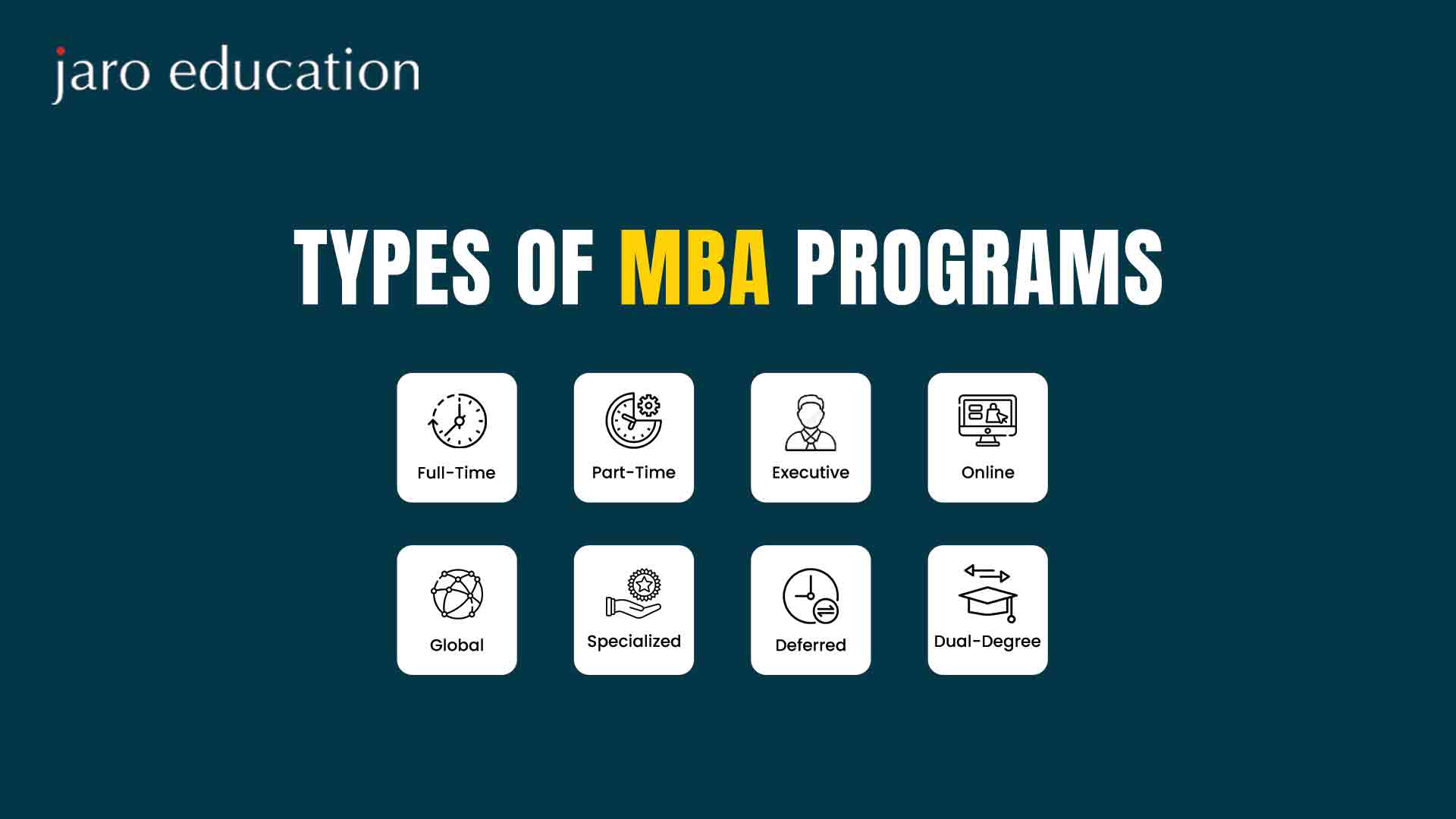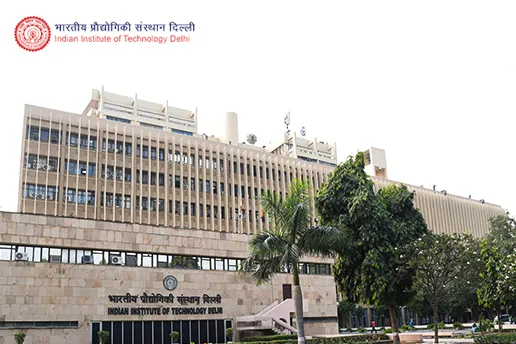
- jaro education
- 27, April 2024
- 10:00 am
An MBA degree has become strategically necessary for individuals looking to progress in their professions and keep up with industry changes in today’s cutthroat corporate environment. However, choosing an MBA degree is only the first step in a path filled with many options. Prospective students have an increasing number of alternatives to choose from when it comes to MBA programs, all designed to fit different schedules, learning styles, and professional goals. In this blog, we are going to discuss the diverse MBA programs that cater to the needs of different individuals.
Types of MBA Programs
Table of Contents
Getting an MBA could be a worthwhile decision if you’ve worked in the industry for a while and want to expand your understanding of leadership, management, and business. Most MBA programs aim to improve your professional experience by equipping you with cutting-edge information and abilities. Hence, depending upon your professional ambitions, experience level, and dedication to expanding your career will help you get a better understanding of the type of MBA program that aligns with the achievement of your objective.
Here is the list of various types of MBA programs:
1. Global MBA
Being proficient in an organization is crucial in the modern, fast-paced corporate environment, especially for those aspiring to establish careers in the global business environment. However, standard business programs, such as a regular MBA, might not give you the necessary background knowledge for a global profession. A Global MBA, on the other hand, offers exceptional chances to broaden your network, improve your cultural intelligence, and acquire a worldwide perspective.
A worldwide business perspective is the main goal of the specialized Global MBA program in MBA education. It extends beyond what can be learned from a typical MBA program. Specializations in global MBA programs will assist you in learning about worldwide business practices and help you understand the differences between national and international business organizations.
2. Executive MBA
Similar to a regular MBA program, an executive master of business administration degree, also known as EMBA, is intended primarily for senior managers and corporate leaders who are currently employed. The company’s executive can pursue an EMBA and obtain the degree while keeping their current positions. Most EMBA applicants are experienced professionals who have been in their industry for a while before enrolling in the program.
3. Full-time MBA
This is the conventional approach, in which students commit to a year or two of full-time coursework. It is appropriate for anyone seeking an immersion opportunity in extracurricular activities, internships, and networking in a business environment.
An in-depth grasp of how businesses operate and how business executives adapt to constantly changing conditions is the goal of the full-time MBA (master of business administration) program in general management. No matter where in the globe a student chooses to study, the core of an MBA program will nearly always contain courses related to finance, marketing, human resources, IT, and operations management.
Top business schools in the world provide elective courses that allow students to specialize in a specific field of interest that is usually closely connected to the industry the students hope to work in the future after completing their graduation. These specialized courses are offered outside of the core curriculum.
A full-time MBA degree can be further categorized into two different categories which include:
1. Two years MBA
Globally renowned business schools provide optional courses that enable students to focus on a particular area of interest, typically closely related to the sector they intend to enter post-graduation. In two-year programs, the first year is devoted to building a strong foundation in all business basics. Hence, all general course requirements are taught in the first year. Following completion of the basic courses, the second year offers a more focused curriculum with an extensive optional selection. A two-year MBA program offers a wider perspective regarding certain topics than a one-year MBA program.
2. One-year MBA
A one-year MBA can be obtained in half the duration as compared to a regular MBA program, meaning that it can be earned in only one year or less. Providing students with the knowledge and abilities needed to thrive in a competitive and ever-changing business environment, a one-year MBA program aims to teach them about management and leadership ideas and practices.
4. Dual MBA
Students pursuing dual degree MBA programs can simultaneously complete both an MBA and a master’s degree in about the same amount of time as it takes to complete a single degree.

*joinleland.com
5. Part-time MBA
The managerial skills and professional advantages of a full-time MBA are equivalent to those of part-time MBA programs, but for that, you won’t have to sacrifice your income or job hours to enroll and obtain an MBA degree. A part-time MBA degree is specially designed for working individuals interested in advancing their careers without taking time off from their respective jobs.
Candidates employed full-time and seeking an MBA can enroll in part-time programs. For this reason, evening and weekend sessions are typical for part-time MBA programs. Compared to full-time MBA students, who must join the workforce with little to no experience after graduation, this is a significant benefit for those candidates pursuing a part-time MBA degree. The knowledge gained in the part-time course can be applied to the profession of the employed candidates which further boosts their career development. Moreover, it also provides a balance between employment and education.
6. Online MBA
Similar to a traditional MBA degree an online MBA degree provides certain extra benefits. You receive more adaptability, improved resource accessibility, and a practical learning approach for self-paced learning. Furthermore, earning a degree online facilitates juggling your existing employment and schooling.
There are various benefits of participating in an online MBA over traditional courses, including the ability to learn from anywhere and flexible study schedules that allow students to balance their personal and professional obligations. Because of this flexibility, students may go at their own speed and receive a well-rounded education.
Taking an online MBA has several advantages over traditional courses, such as adaptable study times that let students manage their personal and work commitments and the opportunity to learn from anywhere. Students can progress at their own pace and obtain a comprehensive education due to this flexibility. Interestingly, under an online MBA course, a candidate can reduce their expenses compared to a candidate pursuing a traditional MBA course.
7. Executive MBA
The executive MBA, or EMBA as it is commonly abbreviated, was designed specifically for students who had a significant amount of prior job experience in the business sector. Since EMBA program participants often have greater practical business expertise, class discussions in these programs are typically more sophisticated.
EMBA programs were designed with busy workers in mind. They are renowned for covering material comparable to standard MBA programs but in a more streamlined manner and with flexible scheduling that lets you fit it around your job. Not only can you improve your management and business abilities, but obtaining this certification will also open doors of opportunity to get a higher salary package and grow in your career.
8. Distance MBA
Traditionally referred to as the “correspondence course,” students get their study materials and other learning tools in the form of email or through the postal service.
Under a distance MBA program, the teachers and students do not communicate, and both of them strictly follow the dates for the exams and submissions. Unlike an online MBA, it does not require a set schedule; instead, students can complete the syllabus at their own steady pace. The greatest flaw of this course is that the students cannot gain any real-world business environment experience as compared to the traditional courses.
Conclusion
To conclude, in today’s dynamic global business market, professionals have changing demands and objectives, which is the reason for creating a wide range of MBA programs. MBA programs give students a variety of alternatives to pursue further education that are catered to their schedules, learning preferences, and professional goals. Dayananda Sagar University’s Executive MBA program is designed to meet the unique needs of working professionals, with a variety of options tailored to their schedules, learning preferences, and career goals. From flexible online formats to industry-specific concentrations and dual-degree opportunities, Executive MBA programmes give students the freedom and versatility to further their education while balancing their professional responsibilities.








